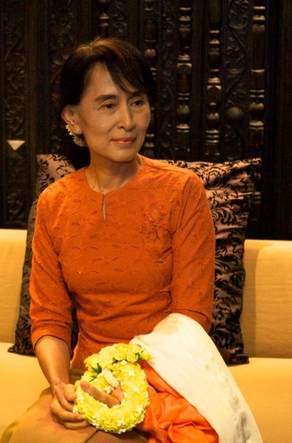A court in Myanmar found former leader Aung San Suu Kyi guilty of election fraud on Friday, and sentenced her to three years in prison with labour. This is in addition to the 17 years she is currently spending in prison for previous charges tried by the military administration.
The most recent decision may also have important political repercussions for Suu Kyi’s National League for Democracy party, as it lends weight to the government’s stated threats to dissolve the party in advance of the fresh election that the military has pledged to hold in 2023.
The general election in 2020 was won by a landslide by Suu Kyi’s party; however, the military took control in February of the following year, preventing her from serving a second five-year term as president. Despite the fact that impartial election monitors did not identify any serious abnormalities, the army maintains that it intervened due of allegations of massive fraud throughout the voting process. Some detractors of Senior Gen. Min Aung Hlaing, who led the coup and is now the top leader of Myanmar, claim that he acted because the vote impeded his own political aspirations. Min Aung Hlaing is the man who led the takeover and is now the main leader of Myanmar.
The capture by the military resulted in large demonstrations that were nonviolent in nature but were put down with deadly force. This resulted in armed resistance, which some United Nations specialists today refer to as a civil war.
Suu Kyi was already serving a sentence of 17 years in jail when she was charged with breaking coronavirus limitations, sedition, five counts of corruption, unlawfully importing walkie-talkies, and having walkie-talkies in violation of the restrictions. Many prominent members of her party and the administration have also been placed behind bars, while others have either gone into hiding or departed the country.
Suu Kyi’s defenders and independent analysts believe that all of the charges brought against her are politically motivated and an attempt to discredit her, legitimise the military’s seizure of power, and prevent Suu Kyi from returning to politics. They say that this is an attempt to keep Suu Kyi from returning to politics.
The ruling that was handed down on Friday by the special court at the prison in the capital city of Naypyitaw was communicated by a legal official who insisted on maintaining their anonymity out of fear of being punished by the authorities. The authorities have severely restricted the release of information regarding Suu Kyi’s trials. According to him, there was not one defendant who seemed to be sick.
He said that both the former president who was removed from office, Win Myint, and the former minister of the president’s office, Min Thu, who were both co-defendants in the election fraud case, were both sentenced to three years in prison. All three were sentenced to periods of imprisonment with labour, a kind of punishment that is separate from hard labour and might entail less strenuous tasks such as working in a factory. In the next days, he noted, legal representatives would submit appeals.
The Electoral Commission, whose members were changed by the military after it took power, is the body that is responsible for filing the election fraud complaint against Aung San Suu Kyi. This case was brought up in November.
The committee said that it had discovered more than 11 million errors in the voter lists, each of which would have enabled voters to cast more than one ballot or conduct some other kind of election fraud.
The new head of the Election Commission, Thein Soe, has said that his organisation is considering dissolving Suu Kyi’s party since it is believed that the party unlawfully collaborated with the government in order to gain an edge in the next elections.
After a meeting of the ruling National Defense and Security Council about two months ago, state media reported that 2,417 officials had been prosecuted for failing to supervise the electoral processes and that action was underway to prosecute voters who cast their ballots more than once. This information was reported after the meeting concluded.
Additionally, the Election Commission has issued a warning that Suu Kyi’s party would be dissolved if it does not turn over its financial records and spending for review.
A member of the Commission named Khin Maung Oo said that the investigation into Suu Kyi’s party would be postponed since some of the party’s officials had been detained, and others had fled into hiding.
Both the charge of violating the Official Secrets Act, which carries a maximum sentence of 14 years, and the seven counts of corruption charges, each of which carries a maximum sentence of 15 years, are being tried against Suu Kyi in separate proceedings.
The fact that the constitution of Myanmar, which was drafted in 2008 under a previous army-led government, allocates 25% of seats in parliament to unelected military officials and grants the military control over key government ministries is the fundamental flaw in the country’s system of democratic governance.
Under the previous administration that Aung San Suu Kyi led, the Rohingya people, who are members of the Muslim faith, were denied the right to vote, and several independent rights organisations voiced their disapproval of this practise.
